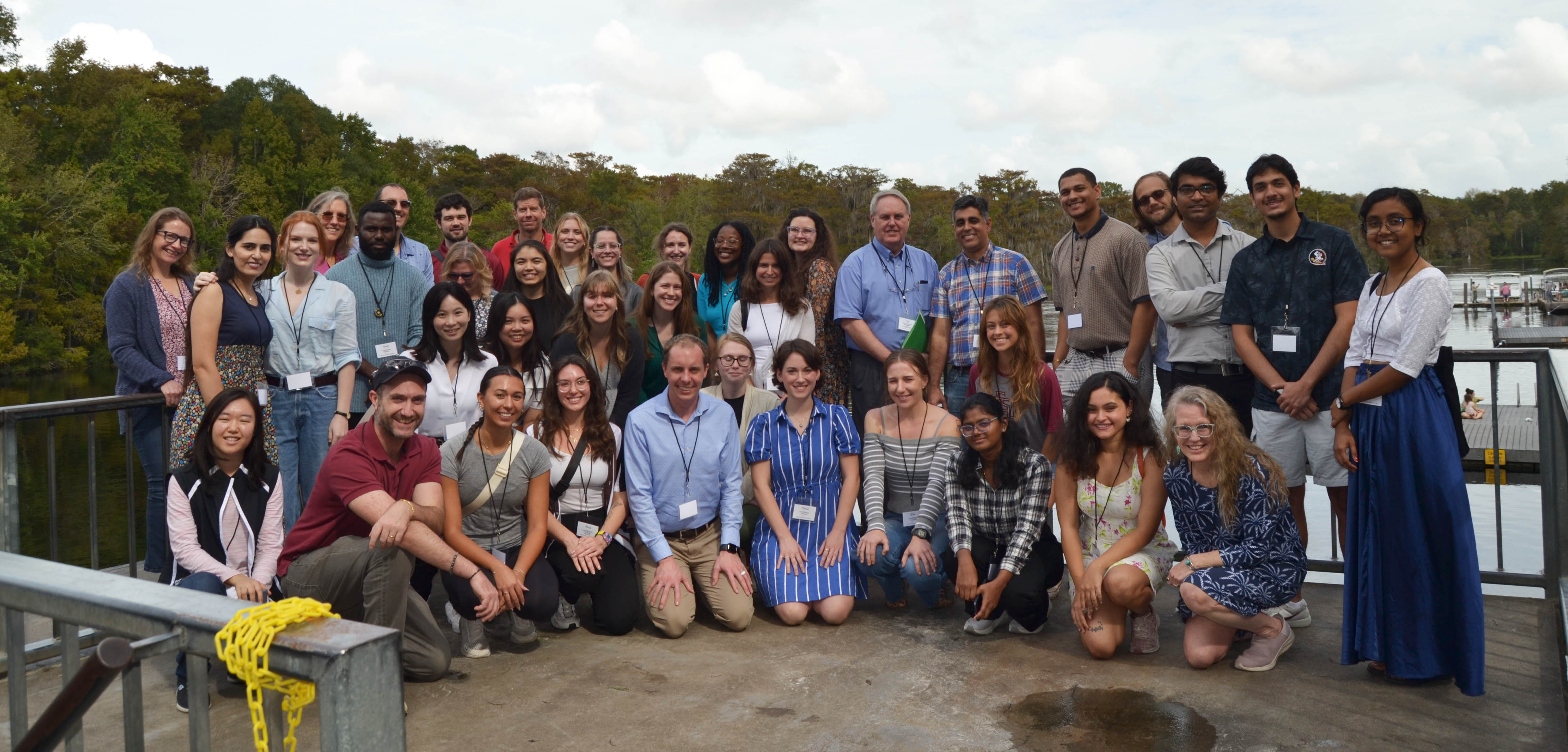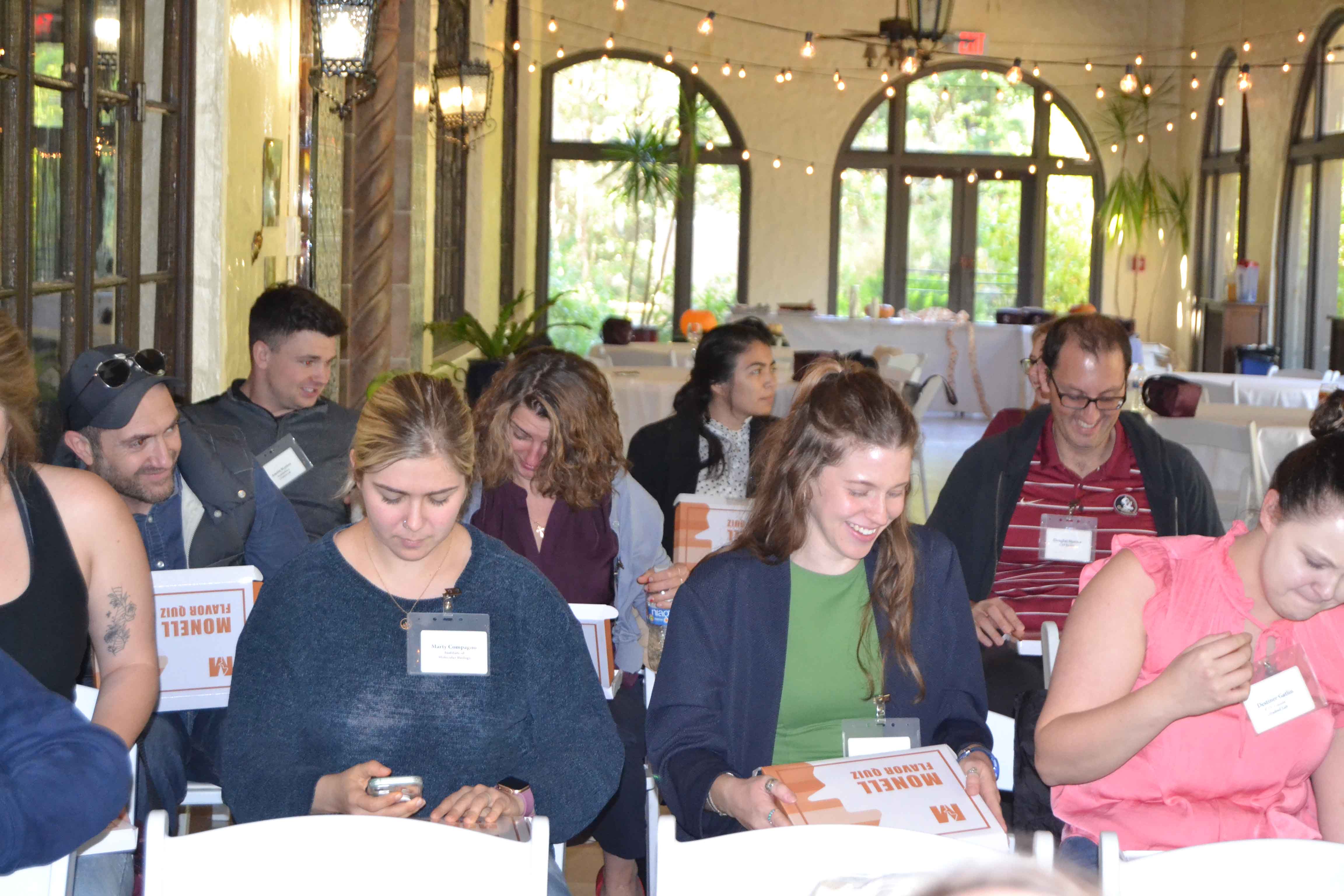
NIH Chemosensory Training Grant Program (CTP) will be hosting a recruitment event for postdoctoral scholar training opportunities starting in 2027.
A Celebration of Neuroscience & Chemical Senses Recruitment Symposium - April 20-21, 2026
Deadline for Applications - February 1, 2026
To APPLY or REGISTER for the Event - LINK HERE
We are seeking PhD Candidates and early-stage postdoctoral scholars that would like to apply for Postdoctoral Training for 2027-2029 at Florida State University with one of our 10 chemosensory faculty preceptors. We have planned a celebration symposium in April and will select 5 applicants to visit our campus to provide an oral presentation of their ongoing research with a conclusion statement of their training/career goals. Selected invited guests will be joined by four of our alumni, current trainees, and faculty preceptors to provide an on-site context of how we mentor junior scientists to become competitive independent researchers and specialist professionals. Guests from the state-wide Florida Smell and Taste Institute are invited to join our current trainees in an accompanying Poster Session of their current research.
Download the Flyer - FLYER_CTP_DEC2025.pdf
MATERIALS TO PREPARE FOR THE APPLICATION
TO APPLY Applicants should submit (SINGLE PDF) a cover letter explicitly addressing your long-term career goals, skills that you want to develop as a postdoctoral scholar, technical equipment or resources that you hope to have access to in terms of training, and the type of institution and professional development you are seeking in your future postdoctoral training opportunity. You will combine your cover letter with your cv or NIH biosketch in the upload. You will be able to select three preceptors to meet with one-on-one during your campus visit, will see laboratory and core facilities for Neuroscience/Chemosensory research, and will tour our university campus.
We anticipate that some individuals will be attending the AChemS International Conference, and we will coordinate travel to the conference following our symposium in Tallahassee.
As part of our 30-year NIH supported training program, scholars participate in semester-long rotating series of reading / practicum group with the trainers, annual special lecture series in the chemical senses, conference travel presentation of their research, and professional development activities with the CTP trainers or FSU postdoctoral association. Scholars are expected to develop an IDP with their selected mentor, and are coached in grant writing exercises to apply for extramural awards and fellowships. Appointments are provided access to health insurance benefits, retirement option plans, Seminole savings program, and an annual training-related expense budget dependent upon pre- or postdoctoral training level. Salary is commensurate with level of experience as set by NIH institutional training grant guidelines. Scholars can be either US Citizens (appointed as NIH postdoctoral scholars) or International visitors (appointed as VP for Research Chemosensory Scholars).
Postdoctoral Trainer expertise ranges from exploration of gustatory and olfactory central coding, taste psychophysics, regulation of ingestive behavior, neuromodulation of ion channels, disruption of olfactory sensory signaling and circuitry attributed to diabetes and obesity, anxiety/threat, or gustatory physiology, olfactory bulb synaptic physiology, and TAAR signaling. Applicants will have the opportunity to train in the laboratory of
along with mentorship by other preceptors on the NIH institutional training grant. Current research focus of these laboratories is to investigate the impact of metabolic disorders (obesity/diabetes) or anxiety/threat on chemosensory function, behavior, and physiology and uses a combinatorial, multidisciplinary approach. We are seeking creative, self-motivated individuals who have strong experimental experiences and the drive to pursue challenging, rigorous studies in the chemical senses. Experimental approaches employed in these laboratories include slice electrophysiology, in vivo awake recording, dynamic clamp, use of optical probes and calcium imaging, whole-nerve recording, optogentic and chemogenetic recording, fMRI, EEG/MEG, behavioral phenotyping, ion channel structure/function studies, protein-protein interactions, whole-animal metabolic phenotyping, tissue culture, psychophysical studies of sensory-mediated behaviors, confocal microscopy, olfactometry, genetically-modified mouse models, transection and lesion analysis of central sensory structures, ingestive behavior phenotyping following gastric bypass surgery, and taste preference testing.
Predoctoral Hiring Requirements -
- Bachelor's or Master's Degree (in biology, psychology, neuroscience, physiology, mathematics, cell or molecular biology) is required.
- On-site or virtual interview with the trainers (preliminary screening at graduate recruitment days)
- US Citizenship
- Applicant should previous research expertise in one or more of the experimental approaches and strong long-term career ambition as a research scientist in the discipline of Chemical Senses
- Strong academic promise and technical aptitude.
Postdoctoral Hiring Requirements -
- Doctorate (MD and/or Ph.D. in medicine, biology, psychology, neuroscience, physiology, cell or molecular biology) is required.
- On-site or virtual interview with the trainers
- US Citizenship (NIH Appointee) or International Scholar (VP for Research CTP Associate)
- Applicant should demonstrate published expertise in one or more of the experimental approaches and strong long-term career ambition as a research scientist in the discipline of Chemical Senses.
- Excellent communication skills, both oral and written.
Preference Given -
- Candidates who are recent bachelor or doctoral graduates
- Candidates with past experience and future career interest as independent researchers in the chemosensory discipline
- Strong scholastic aptitude
- Highly motivated to join an interactive training program in the neurosciences
For questions concerning the Chemosensory Training Grant Program and its opportunities, please contact Debra Ann Fadool.
History
Florida State University remains a rich training ground for postdoctoral scholars in the Chemosensory Sciences, initiating from pioneers in this discipline that built this scientific strength upon joining the university. Professor Lloyd Beidler was called "the father of taste physiology", coming to FSU in 1950, just as the university was growing into its status as a major research institution, and his influence was strongly felt in the formation of the Department of Biological Science in 1956 from a collection of small teaching departments and the university's transformation into a major force in neuroscience research. Professor Pasquale Graziadei was the first to propose in 1966, then demonstrate, that olfactory receptor neurons were continually generated in vivo – from the population of globose basal cells. He showed that olfactory neuron axons were critical in inducing the formation of their target, the olfactory bulb, during normal development. Professor Michael Meredith joined FSU in 1981, and has been instrumental in guiding the field in functionally mapping brain regions responsible for socially relevant and non-relevant stimuli and exploring the effect of reproductive experience on chemosensory transmission. Professors Meredith and Mark Berkley formally originated our Program in Neuroscience in 1991, and Meredith launched a successful training of predoctoral students and postdoctoral scholars by securing a training grant from the National Institutes of Health at the NIDCD in 1995. We are currently in our twenty-fifth year of the program and have graduated over 50 chemosensory scientists that hold positions in academia, industry, and the government sector. Professor Debra Ann Fadool serves as director of the program, joined by the new assistant director, Professor Paul Trombley.
NIH Chemosensory Training Grant Program Today
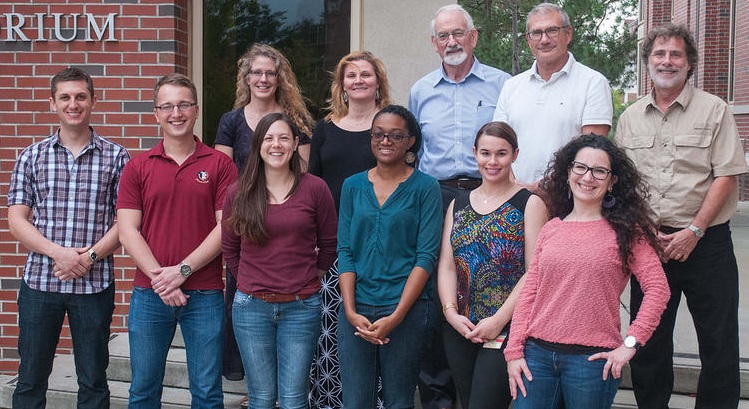
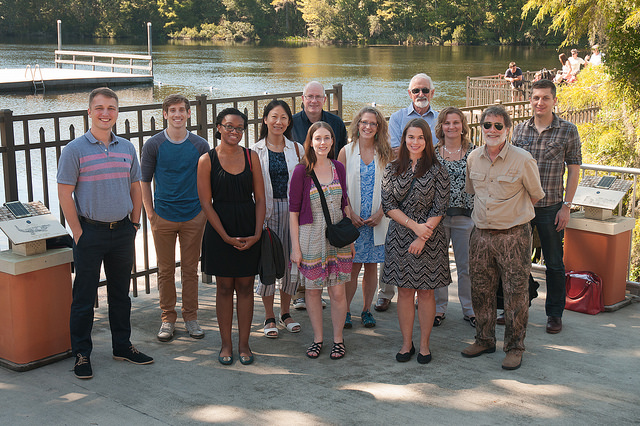
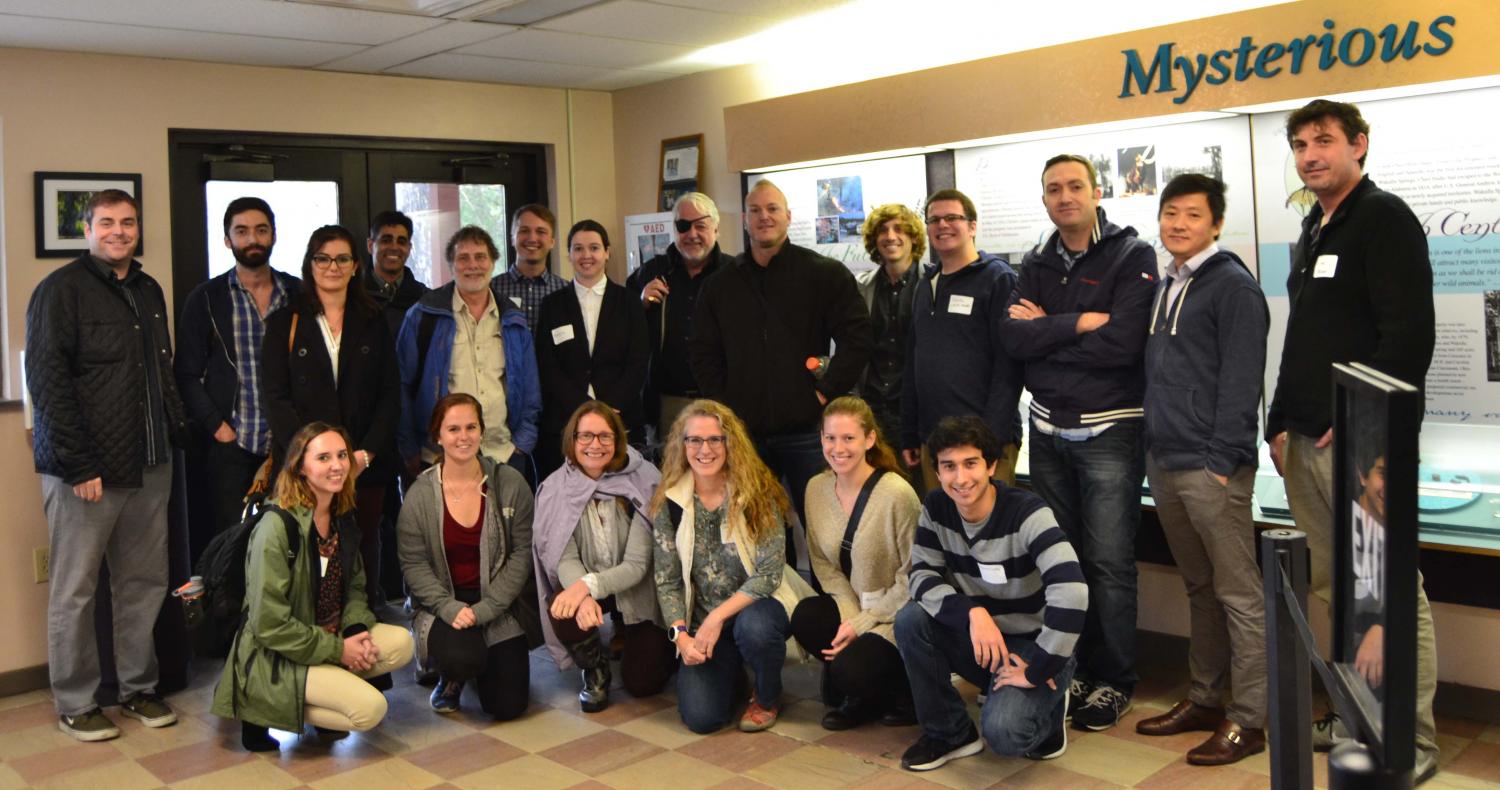
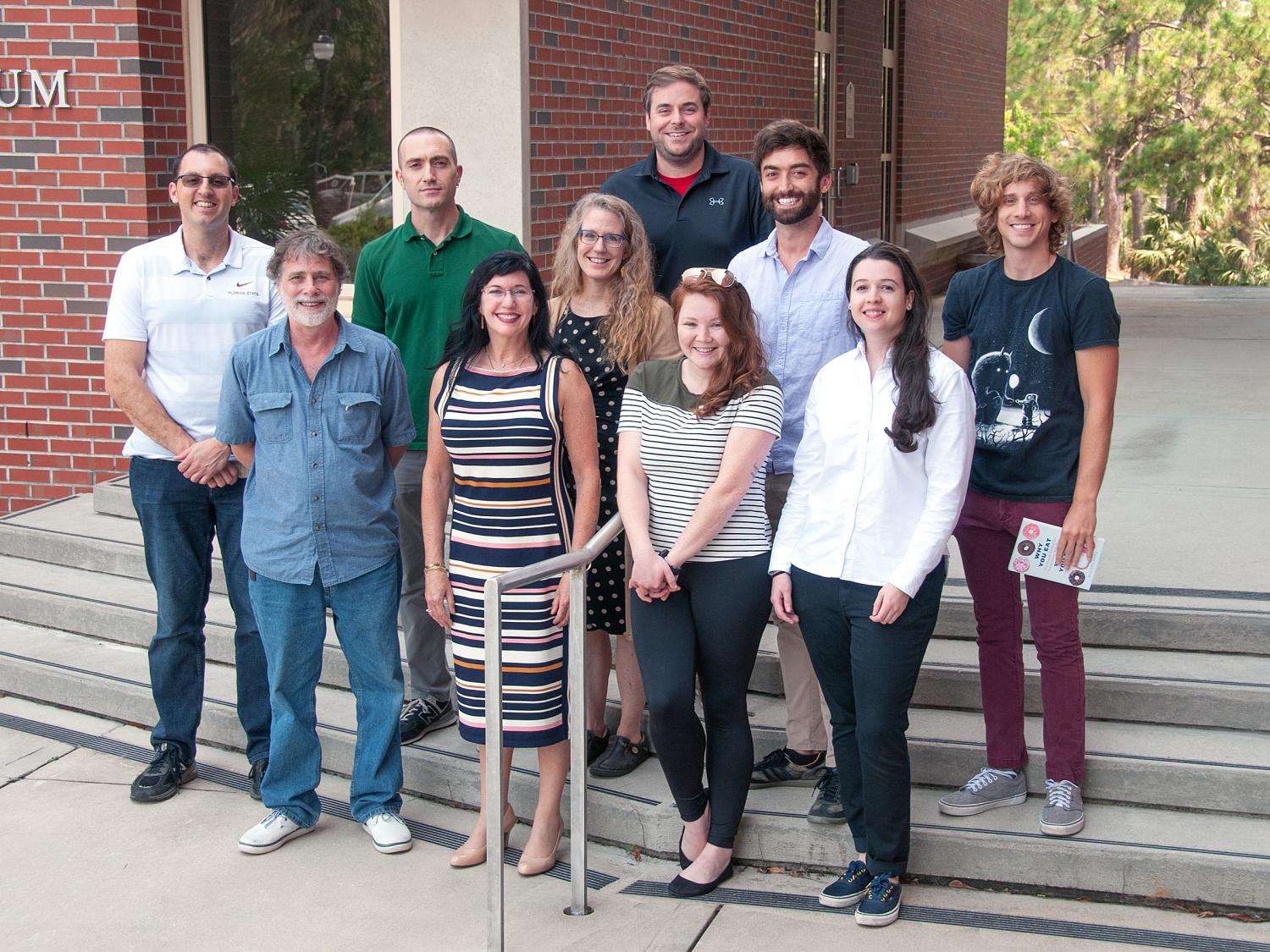

Chemosensory Fall 2024 Retreat at Wakulla Springs
November 8, 2024, 8:30 am to 6:00 pm, Edward Ball Lodge, Terrace
Retreat Flyer Download - 2024 Chemical Senses Retreat Flyer_V4_Digital_website.jpg
Agenda -
8:00 to 8:30 am - Arrival, Registration, Coffee/Tea
8:30 to 12:15 pm - Trainee Presentations
12:15 - 1:45 pm - Lunch
1:45 pm - Professional Development Lecture
3:00 pm - River Cruise
4:30 pm - Keynote Address
6:00 pm - Early Evening Reception
There was a fall Chemosensory Training Grant Retreat at Wakulla Springs State Park at the Edward Ball Lodge. The event was designed for our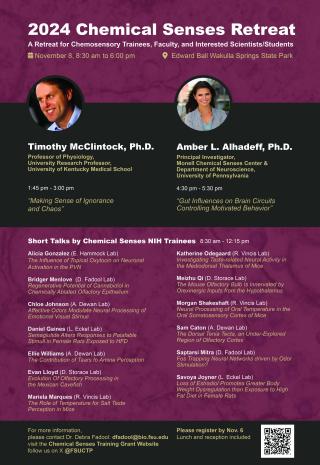 chemosensory trainees (postdoctoral and predoctoral), faculty, postdoctoral scholars, interested scientists and FSU scholars, and students in our new undergraduate Neuroscience Degree Program. Members of the Program in Neuroscience, Biomedical Science, Biological Science, and Institute of Molecular Biophysics communities are encouraged to attend. Everyone with an interest in chemosensory research (and desire to learn more about the intersection between sensory nutrition, obesity and chemosensory science) was welcomed. The morning was dedicated to 12-minute progress reports from our doctoral and postdoctoral trainees that cover the physiology, behavior, molecular, or psychophysical explorations of olfaction, taste, ingestive or innate behaviors. We had a picnic lunch on the deck outside the pavilion. Dr. Tim McClintock, University Research Professor at the University of Kentucky Medical School gave a professional development talk - "Make Sense of Ignorance and Chaos". We enjoyed a one hour river cruise for the late afternoon. Following the tour, a special keynote address was given by Dr. Amber L. Alhadeff from Monell Chemical Senses Center, Philadelphia - "Gut Influences on Brain Circuits Controlling Motivated Behavior”. Following the keynote address we had an early evening reception on the Terrace of the Edward Ball Lodge.
chemosensory trainees (postdoctoral and predoctoral), faculty, postdoctoral scholars, interested scientists and FSU scholars, and students in our new undergraduate Neuroscience Degree Program. Members of the Program in Neuroscience, Biomedical Science, Biological Science, and Institute of Molecular Biophysics communities are encouraged to attend. Everyone with an interest in chemosensory research (and desire to learn more about the intersection between sensory nutrition, obesity and chemosensory science) was welcomed. The morning was dedicated to 12-minute progress reports from our doctoral and postdoctoral trainees that cover the physiology, behavior, molecular, or psychophysical explorations of olfaction, taste, ingestive or innate behaviors. We had a picnic lunch on the deck outside the pavilion. Dr. Tim McClintock, University Research Professor at the University of Kentucky Medical School gave a professional development talk - "Make Sense of Ignorance and Chaos". We enjoyed a one hour river cruise for the late afternoon. Following the tour, a special keynote address was given by Dr. Amber L. Alhadeff from Monell Chemical Senses Center, Philadelphia - "Gut Influences on Brain Circuits Controlling Motivated Behavior”. Following the keynote address we had an early evening reception on the Terrace of the Edward Ball Lodge.
Summary:
Professional Development: "This is a 45-minute talk takes an unusual approach to the topic of preparing yourself for a career that makes use of your advanced training in science, whether that career is industry, academia, teaching, consulting, government, or administration. Examples of the development of expertise demonstrate how you can leverage your training into the career you love." - Tim McClintock
Keynote Address: "What controls hunger? How do we know when we are full? And how does what we eat influence our brain activity and behavior? In this talk, I will discuss the biological bases of gut-brain communication and the neural circuitry that controls our eating behavior." - Amber Alhadeff
Chemosensory Fall 2022 Retreat at Wakulla Springs
October 21, 2022, 8:30 am to 6:00 pm
Retreat Flyer Download - Available here
There was a fall Chemosensory Training Grant Retreat at Wakulla Springs State Park at the Edward Ball Lodge. The event was for our chemosensory trainees (postdoctoral and predoctoral), faculty, postdoctoral scholars, interested scientists and FSU scholars, and students in our new undergraduate Neuroscience Degree Program. Members of the Program in Neuroscience, Biomedical Science, Biological Science, and Institute of Molecular Biophysics communities are encouraged to attend. Everyone with an interest in chemosensory research (and desire to learn more about the intersection between Covid and Chemosensory loss) was welcomed. The morning was dedicated to 12-minute progress reports from our doctoral and postdoctoral trainees that cover the physiology, behavior, molecular, or psychophysical explorations of olfaction, taste, ingestive or innate behaviors. We had a picnic lunch on the deck outside the pavilion. Dr. Danielle Reed, Assistant Director of the Monell Chemical Senses Center in Philadelphia gave a professional development talk - "Cultivating your emotional maturity to improve your science" followed by a primer on Covid and chemosensory loss - "COVID - Collaborative science and chemosensory science". We enjoyed a one hour river cruise for the late afternoon. We returned for a special keynote address by Dr. Marianna Zazhyska from the Zuckerman Institute, Columbia University - "Non-cell-autonomous disruption of nuclear architecture as a potential cause of COVID-19-induced anosmia”. An excerpt describing the lectures can be found below.
Summary:
Professional Development: "This is a 45-minute professional development talk that will emphasize the importance of cultivating emotional maturity in the process of science, drawing on my story and the unique challenges of our chosen scientific career. Have you ever feared authority figures, felt isolated, or were frightened or made angry by professional criticism? Me too!" - Danielle Reed
Covid Tutorial: "While COVID has transformed our world in ways that are difficult or impossible to appreciate now, it expanded our scientific toolkit. I will share how the Global Consortium for Chemosensory Science came together worldwide to understand chemosensory loss - translating the questions asked of participants into over 30 languages. I will also keep us updated with the new variants and how they affect taste and smell." - Danielle Reed
Keynote Address: "Solving the puzzle behind COVID-19 induced smell loss - COVID-19 pandemic elevated the smell loss, or anosmia, to a renewed focus, highlighting it as a hallmark symptom of infection with SARS-CoV-2. Unlike diminished odorant perception that often accompanies other viral upper respiratory infections, COVID-related anosmia appears without obvious nasal congestive symptoms. It quite often manifests as the only symptom for otherwise asymptomatic patients. I will present approaches we employed and results we achieved in an attempt to decipher a puzzling mechanism of SARS-CoV-2 induced anosmia." - Marianna Zazhyska
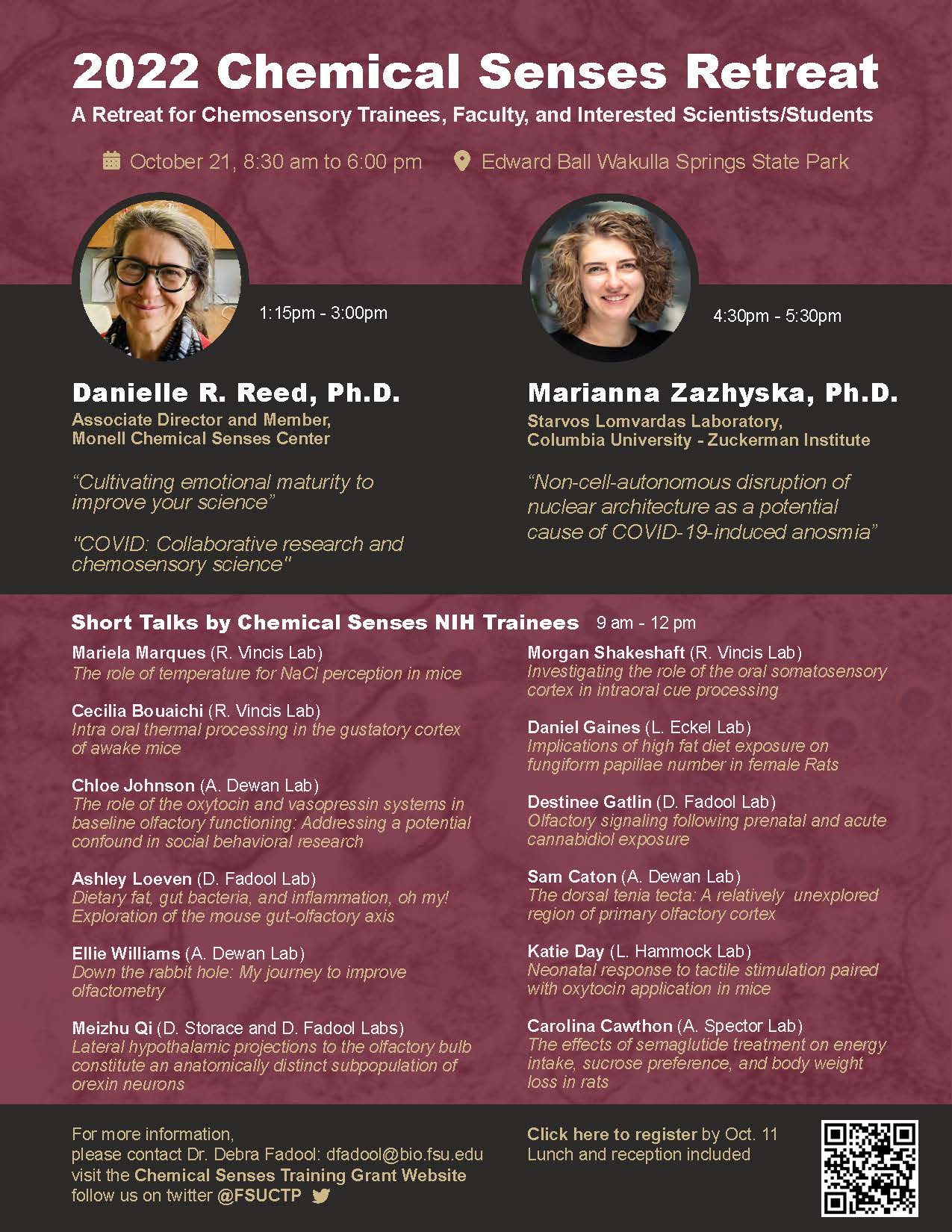
Chemosensory Fall 2020 Retreat was Virtual
Download copy of the Retreat Poster here
This year's Chemosensory Retreat was on Friday, November 20, from 2 to 5:30 pm. Florida State CTP Trainees proudly welcomed our chemosensory neighbors at the University of Florida Smell and Taste Institute, Monell Chemical Senses Center, Florida Institute of Technology, and the Rocky Mountain Smell and Taste of the University of Colorado, Denver as our special guests to the retreat.
We know predoctoral and postdoctoral scholars were trying to adapt to new communication platforms and were likely more isolated in terms of their normal research interactions during the pandemic. Therefore, the 2020 retreat was 100% professional development! The theme was Interviewing in a Virtual Space. In the morning, CTP trainees gave 12 minute research talks to CTP faculty to communicate their latest findings and plan their upcoming experiments. The afternoon kicked off with an introduction and keynote address by Megan Crowe, FSU Assistant Director of Career Advising and Counseling, on “Personal Branding and Communication.” Next, attendees broke out into parallel mock interview sessions where participants observed mock interviews moderated by FSU CTP alumni for various positions including graduate school, postdoctoral fellowships, assistant professorships, industry scientist positions, government scientist positions, or other non-academic positions. The afternoon concluded with an opportunity for participants to network and engage with fellow chemosensory scientists and other interested students and scientists during a social hour using “Gathertown”. Thank you so much to our attending guests and terrific alumni that served as moderators!
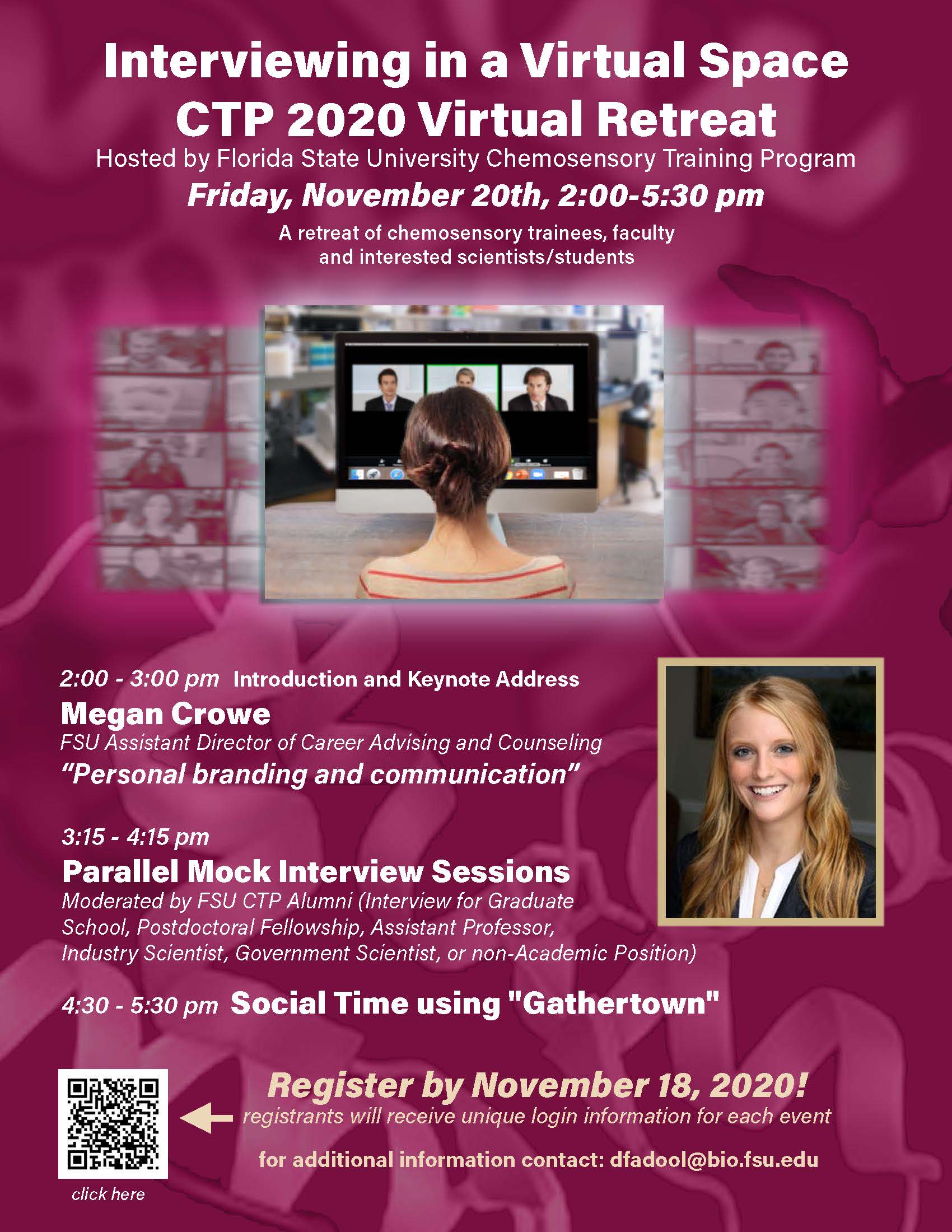
Chemosensory Fall 2018 Retreat at Wakulla Springs
November 14, 2018, noon to 5:30 pm
Retreat Flyer and Schedule - Available here
There was a fall Chemosensory Training Grant Retreat at Wakulla Springs State Park at the Dogwood Pavilion. The event was for our chemosensory trainees (postdoctoral and predoctoral), faculty, postdoctoral scholars, and interested scientists and students. Members of the Program in Neuroscience, Biomedical Science, and Biological Science communities were encouraged to attend. We were glad that students enrolled in our new Neuroscience Undergraduate Major came to participate! The timing of the keynote address coincided with our normal colloquium time on Wednesdays, but in a special environment!! Everyone with an interest in chemosensory research (and a love of expert neuroanatomy!) was welcomed. We started the afternoon with a picnic lunch on the deck outside the pavilion. Each of our supported trainees provided 12- minute talks of their progress and future research plans that cover the physiology, behavior, molecular, or psychophysical explorations of olfaction or taste. Following the short talks, we enjoyed a one hour river cruise for the mid afternoon. We then returned for a special keynote address by Dr. Charles Greer, Department of Neurosurgery & Neuroscience, Yale School of Medicine who spoke on "Determinants of cell fate in the olfactory system". An excerpt describing his lecture can be found below.
Summary:
"The mechanisms regulating cell fate in the 6-layer neocortex have been widely studied. Seminal insights from these studies have emerged into the role(s) of transcription factor up- and down-regulation, the impact of sensory experience and the importance of neurogenesis timing and migration. In contrast, fewer studies have explored the operative mechanisms in 3-layer paleocortex (piriform and tubercle) or the olfactory bulb. I will explore recent studies from my lab that address how mitral cell fate (location) in the olfactory bulb is a determinant of the type of input they receive. Then, using a system we recently developed to track the origins and migration of paleocortical pyramidal neurons, we can discuss the features that distinguish neuronal fate in olfactory cortices versus neocortex." - Charles Greer
Chemosensory Fall 2016 Retreat at Wakulla Springs
September 30th, noon to 5:30 pm
Retreat Flyer and Schedule - 'Click' here to download
Check out photos from the Event - 'Click here' to view
There was a fall Chemosensory Training Grant Retreat at Wakulla Springs State Park at the Dogwood Pavilion. The event was for our chemosensory trainees (postdoctoral and predoctoral), faculty, postdoctoral scholars, and interested scientists and students. Everyone with an interest in chemosensory research was welcomed. We started the afternoon with a picnic lunch on the deck outside the pavilion. Each of our supported trainees provided 12- minute talks of their progress and future research plans that covered the physiology, behavior, molecular, or psychophysical explorations of olfaction or taste. Following the short talks, we took a break and enjoyed a one hour river cruise for the mid afternoon. We returned for a special keynote address by Dr. Robert J. Lee of the University of Pennsylvania who spoke on "Bitter bodyguards and sweet sentinels: taste receptors in airway immunity". An excerpt from his research page can be found below.
"We study the epithelial cells that line the airway. When airway cell function goes awry, it can lead to diseases such as cystic fibrosis (CF), asthma, chronic rhinosinusitis (CRS), and allergy. To understand how airway cells sense and respond to pathogens, we combine biochemistry and molecular biology with real-time measurements of airway cell signaling and associated physiological responses, including ciliary beating, calcium signaling, fluid secretion, ion transport, nitric oxide production, and antimicrobial peptide secretion. Our goal is to better understand the cellular and molecular basis of airway diseases to identify novel molecular targets for new therapies." - Robert Lee

